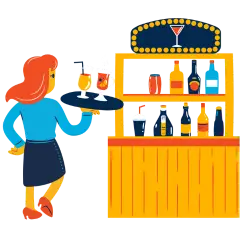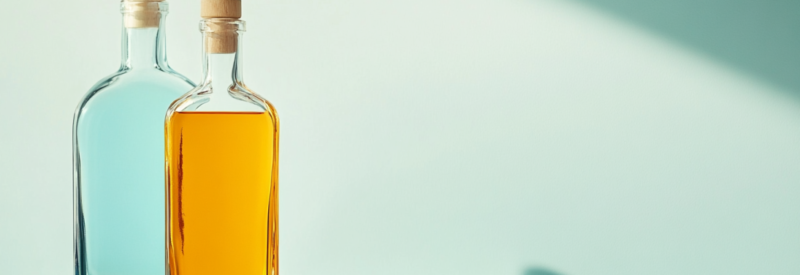New Jersey is notorious for expensive and time-consuming liquor license applications. With severe restrictions on how many liquor licenses are available in the state, prices for some licenses have skyrocketed — one restaurant recently paid $2.3 million for a liquor license.[1]NJ Spotlight News. “Why lawmakers take another swing at changing NJ’s liquor license laws.” Accessed October 8, 2024. The shortage resulted in a new law being approved in January 2024, which will produce 1,500 more licenses available to business owners — but calls continue for further reform.[2]NJ.com. “N.J. booze laws were just tweaked as Murphy signs watered-down bill.” Accessed October 8, 2024.
Regardless of any future changes, New Jersey business owners have to operate within the current parameters. So, is it possible for your business to obtain a liquor license in New Jersey? The answer depends on the type of license, your budget, and various other factors. This guide explores the types of liquor licenses in New Jersey, the requirements, how to apply, and other related topics. Read ahead if you want to obtain a liquor, beer, or wine license in New Jersey!
Types of New Jersey Liquor Licenses

In New Jersey, the Division of Alcoholic Beverage Control (ABC) regulates the alcohol industry. This includes providing licenses to business owners operating in the sector. There are numerous licenses available — license types vary depending on the activities of the business. In total, there are five different types of liquor license classes: manufacturers, wholesalers, retailers, transporters, and public warehouses. If you want to sell alcohol to consumers, you need a license in the retail class (Class C). Below, let’s explore some of the most popular New Jersey retail liquor licenses:
Plenary Retail Consumption License
A Plenary Retail Consumption License is one of the primary liquor licenses available to businesses in New Jersey. This license allows businesses to sell alcohol for on-premises consumption and packaged beverages for off-premises consumption. However, all sales must occur in a public barroom. This license is subject to a quota—there is only one license available per 3,000 residents in a municipality.
Plenary Retail Consumption License with Broad Package Privilege
This is a liquor license suitable for a restaurant or business that also wants to operate a liquor store. It permits privileges similar to a Plenary Retail Consumption License, except it also allows the business to sell alcohol in an area that is not in the “public barroom” of the business. This license is subject to quotas, and new applications are no longer accepted — you can only obtain it by renewing an existing license.
Seasonal Retail Consumption License
This license offers similar benefits to the Plenary Retail Consumption License, except it’s restricted to seasonal use. There are two periods available: May 1st to November 14th and November 15th to April 30th. This is a suitable option for businesses that operate only at specific times of year (for example, a business that is only open during summer months). This license is subject to quota laws.
Plenary Retail Distribution License
This is a liquor license designed for businesses selling packaged alcoholic goods without on-premises consumption. The number of licenses available in this category is restricted to one per 7,500 people in the municipality.
Theater License
This is a Plenary Retail Consumption License for non-profit corporations with theater or musical performance shows. The venue must have a minimum capacity of 1000, and the permit only allows for alcoholic consumption for two hours before the show, during the show, and two hours following the show. There are no quota restrictions on this license.
Hotel/Motel License
This is a liquor permit for hotels and motels with 100 or more guest rooms. It allows for the sale and consumption of alcoholic beverages. There are no quota restrictions for this license.
Other Licenses
Other retail licenses are also available, including a Plenary Retail Consumption license with a Brew Pub License, Plenary Transit License, Club License, and Limited Retail Distribution License.

What type of liquor license do I need?
The type of liquor license your business requires will vary depending on how you sell alcohol. For example, if you only sell alcohol for off-premises consumption, you don’t need a Plenary Retail Consumption License; a Plenary Retail Distribution License is much more suitable. It’s best to assess your business activities and inspect the full list of retail liquor licenses before you begin applying. Also, considering future business growth plans is essential. Make sure your liquor license allows your business to expand to other activities if your enterprise plans to evolve in the future.
We only explored retail licenses in the “Types of New Jersey Liquor Licenses” section. If you’re a wholesaler, manufacturer, transporter, or warehouse provider, you need another type of liquor license. Make sure to explore all classes of liquor licenses to determine which is applicable to your business.
Liquor License Requirements for New Jersey
New Jersey’s liquor license application requires extensive details about your business and its plans for operation. Collecting the correct information upfront is essential to avoid delays in the licensing process. You can view this general application for retail liquor licenses in New Jersey for any other requirements.
Required details from the application:
- The type of license your business requires
- The type of business structure (LLC, LP, etc.)
- The name of the business (or club, organization, etc.)
- The address of the premises
- The mailing address of the premises (if it varies from the trading address)
- Trade names of the business (include all names)
- How many buildings are under the license
- The amount of floors within a building under the license
- The mortgage holder of the building
- The landlord of the building
- The nature of the business (restaurant, catering, hotel, etc.)
- Personal details of other individuals operating the business
- Details about the applicant’s previous liquor license applications, denials, etc.
- Details about criminal history that may result in an individual being ineligible for a license.

Other necessary permits
While a liquor license is likely the most challenging permit to obtain when you start a new business in New Jersey, it’s not the only permit to consider. Depending on the type of business you’re opening, there are other licenses required by local and state authorities. Fortunately, New Jersey makes it simple to find out which licenses you need to operate your business by reviewing their database of licenses. However, New Jersey’s database only covers statewide licenses. You must also check with your local municipality to see if they require region-specific licenses or permits.
Understanding Liquor Laws in New Jersey
Any business selling alcohol in New Jersey must have extensive knowledge of the state’s liquor laws. Let’s explore the laws surrounding the sale of alcohol in New Jersey:
- You must be 18 to sell, serve, prepare, or solicit the sale of alcohol.
- No one under the age of 15 can work in any capacity within a business that has a plenary retail liquor license.
- Most establishments can sell alcohol between 9:00 AM and 10:00 PM, seven days per week.
- Some casinos in Atlantic City can sell alcohol 24/7.
Municipalities control much of the liquor laws in New Jersey. Before selling alcohol, consult your municipality’s liquor laws.
How Much Does a Liquor License Cost in New Jersey?
So, how much is a liquor license in New Jersey? The cost of a liquor license in New Jersey varies depending on the license type. However, New Jersey isn’t like other states. Many of its licenses are auctioned off. Due to the quotas on the most popular licenses, estimates suggest the average New Jersey liquor license costs $350,000.[3]Huckleberry. “How to get a liquor license in New Jersey.” Accessed Accessed October 8, 2024. If you want to open a business that sells alcohol in New Jersey, be prepared to break the bank!
How to Apply for a Liquor License in New Jersey
Some liquor licenses in New Jersey are subject to strict quotas, so make sure to check if there are any available licenses for your license type before you begin the application. While the process for applying for a liquor license in New Jersey varies depending on the license type, you must fill out this form. The process depends on whether you’re applying for a brand-new license or buying the license from an existing licensee.
Again, as many licenses are subject to quota, one of the most popular ways to obtain a license is via public auction. Unfortunately, this means you may have to bid on a license, and many licenses can exceed $1 million.
How to Renew your New Jersey Liquor License
Renewing your license on time is essential if your business wants to avoid losing its liquor license. Each year, the licensee must renew its license and pay the applicable fees before July 30th. Not doing so may result in the complete loss of the license — retaining an expired license requires a Special Ruling.
Licensees can renew their license with either the New Jersey Division of Alcohol and Beverage Control (ABC) or their local municipality. If you want to renew your license online, head to the ABC website and create an account. If your license is eligible for online renewal, you will be able to access the renewal application within your licensee portal. You can also pay your license fees on this website.
Getting a Beer and Wine License in New Jersey: Closing Thoughts

While getting a liquor license in New Jersey can be challenging, laws are changing, making it possible for obtaining one in the future to be simpler. Follow the steps outlined in this guide to start the application process to get your liquor license. Once you obtain a New Jersey liquor license, you’ll benefit from access to a population of 6.03 million people over the age of 21, as well as a bustling tourism sector.[4]Infoplease. “NJ Demographic statistics.”Accessed October 8, 2024.
After you’ve got your New Jersey beer and wine license, it’s time to find a payment processing partner to help you accept credit card payments from customers. Fortunately, bar and restaurant providers work with New Jersey businesses in the alcohol industry to provide payment services. Better yet, these merchant account providers also offer dedicated account managers, 24/7 support, industry-specific tools, and high-grade fraud prevention services. Reach out today to see what we can do for you!
FAQs
How long does it take to get a liquor license in New Jersey?
The length of time it takes to get a liquor license in New Jersey varies, especially with licenses subject to quotas. For standard licenses, the application process takes between 30 and 90 days. But if you require a license subject to quota, you may need to wait for one to go up for auction (it’s impossible to predict how long this will take).
Do you need a liquor license to sell beer or wine in New Jersey?
Yes, you need the correct license to sell beer or wine in New Jersey. The type of license you need depends on your business type.
Is it hard to get a liquor license in New Jersey?
Obtaining a liquor license in New Jersey can be extremely challenging due to quota restrictions on some license types. While recent law changes have increased the number of licenses available, some businesses still struggle to obtain the liquor licenses they require to sell alcohol. Make sure to begin the application process as soon as possible to avoid disruptions to your business plan.
How long does a New Jersey liquor license last?
Most liquor licenses in New Jersey last for one year, so make sure to renew your license on time if you want to continue selling alcohol. However, there are also one-day liquor licenses available for special events.
How do I get a temporary or one-day liquor license in New Jersey?
Yes, one-day liquor licenses are available in New Jersey for $500 per day. You can only purchase 14 of these licenses in a single year.




